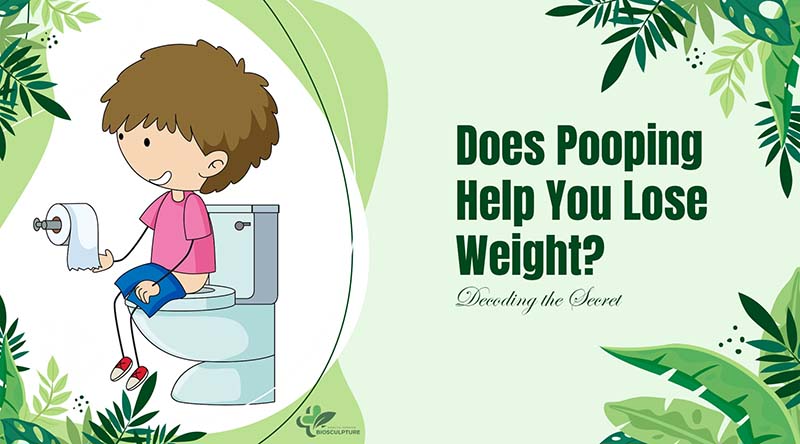It may surprise you to learn that the average person could be carrying several pounds of waste in their body at any time. This startling revelation often brings up the topic of “Does pooping help you lose weight?” While it might seem straightforward at first, the connection between bowel movements and weight loss is more intricate than initially meets the eye. In this blog, we’ll explore how digestive health influences weight loss efforts and how understanding this relationship can lead to more effective outcomes.

1. Understanding Digestion and the Weight of Stool
Stool weight and the resulting changes on the scale after defecation vary based on individual bowel movement frequency. Research indicates that a normal range for bowel movements is approximately 1.2 times per day.
A “normal” frequency for bowel movements doesn’t have a strict definition, but it’s generally accepted that a healthy range is from three times a day to three times a week.
Several factors influence both the frequency and weight of stool, including:
- Diet
- Fiber intake
- Body size
- Hydration levels
Your diet and how often you eat significantly impact stool weight. High-fiber foods tend to increase stool bulk, resulting in heavier bowel movements.
Additionally, individuals who are overweight or obese may experience irregular bowel patterns and diarrhea more frequently, which can also impact the weight of stool.
Note: Increasing your fiber intake not only aids in producing more substantial bowel movements but also helps in maintaining gut health and regularity. Drinking plenty of water is crucial when increasing fiber to prevent constipation
2. Does Pooping Really Help You Lose Weight?
The weight loss associated with bowel movements varies from person to person but is generally minimal and short-lived.
Digestion starts in the mouth and concludes in the small intestine, where the body absorbs nutrients and calories. The remnants of this process are then expelled as stool. By the time feces are eliminated, the body has already absorbed most of the calories and nutrients.
Additionally, stool is predominantly water, comprising about 75% of its volume. Therefore, any weight loss noticed after defecation is primarily the loss of water weight, not fat.
Note: While regular bowel movements are a sign of good digestive health, they should not be considered a method for significant weight loss. Maintaining a balanced diet and regular exercise is more effective for long-term weight management.

3. Is Pooping an Effective Weight Loss Strategy?
While we do experience a minor weight reduction after pooping, it is not a sustainable or effective method for losing the kind of weight that impacts our health significantly: body fat.
Health professionals highlight the risks of fat accumulation around the waist, known as visceral fat. Unlike subcutaneous fat, which is located just under the skin, visceral fat is stored deeper within the abdomen, encasing internal organs.
This type of fat is particularly concerning because it’s linked to several health issues, including metabolic disturbances, a higher likelihood of heart disease, type 2 diabetes, as well as breast cancer and gallbladder diseases in women.
To effectively reduce body fat, the strategy should involve consuming fewer calories than you burn. This can be achieved through a balanced diet and regular physical activity, not through the frequency of bowel movements.
To lose weight, incorporate daily exercise into your routine, aiming for at least 30 minutes of moderate activity like walking, swimming, cycling, jogging, or weightlifting.
Additionally, regular exercise can promote consistent bowel movements. You may notice an increase in bowel frequency when you start a new workout regimen.
4. How Much Stool Does the Body Typically Contain?
The Centers for Disease Control (CDC) reports that the average American man weighs approximately 195.7 pounds, while the average American woman weighs about 168.5 pounds. Based on these averages, a man typically generates around 1 pound of stool daily, whereas a woman produces about 14 ounces each day. These quantities are stored within the large intestine before being expelled.
Note: The amount of stool produced can vary greatly from person to person and is influenced by factors such as diet, hydration, and overall health. A balanced diet rich in fiber can help maintain regular bowel movements and digestive health.
5. Do You Poop More When on a Weight Loss Diet?
Weight loss diets rich in fruits, vegetables, and whole grains typically increase dietary fiber intake, which can lead to more substantial and frequent bowel movements. While an uptick in bowel activity may occur, the actual weight loss results from other facets of the diet, not just the increased frequency of bowel movements.
High-protein diets, often featuring meat, might make digestion harder. These diets can sometimes lack sufficient fiber, leading to softer, less formed stools or even constipation.

6. Expert Advice: Healthy Digestion and Effective Weight Loss
A well-functioning digestive system is crucial for successful weight loss. Inefficient digestion can lead to poor nutrient absorption, impeding weight loss progress. To enhance digestive health, prioritize the consumption of natural foods like fruits, vegetables, and whole grains, which are rich in fiber. Minimize intake of processed items, as well as fatty and fried foods.
Hydration is another key element; drinking ample water between meals can not only help manage appetite but also facilitate better digestion. Incorporating probiotics into your diet can enhance gut flora, leading to improved digestive health. Regular physical activity additionally aids in reducing bloating and enhancing digestive efficiency.
It’s essential to recognize that while good digestive health supports weight loss, it is not a direct method for losing weight. Instead, it ensures better nutrient utilization and overall well-being. A balanced gut microbiome, populated with beneficial bacteria, is associated with a healthier weight. To maintain optimal gut health, eat a varied and balanced diet, stay well-hydrated, and avoid gut-damaging foods like processed items and artificial sweeteners.

7. Conclusion
In conclusion, although pooping may slightly contribute to immediate weight loss, it is not a quick fix for shedding pounds. Understanding the complex relationship between digestion and weight loss is crucial. We hope this blog has clarified the common question, “Does pooping help you lose weight?” and provided valuable insights into how improving digestive health can support your weight loss goals.
We’d appreciate your feedback and stories on the impact of digestive health on your weight loss journey in the comments below. Your insights could greatly benefit others on similar paths. Also, check out more from Biosculpture to boost your health and fitness knowledge. Thanks for your support, and we’re excited to share more valuable content with you.


